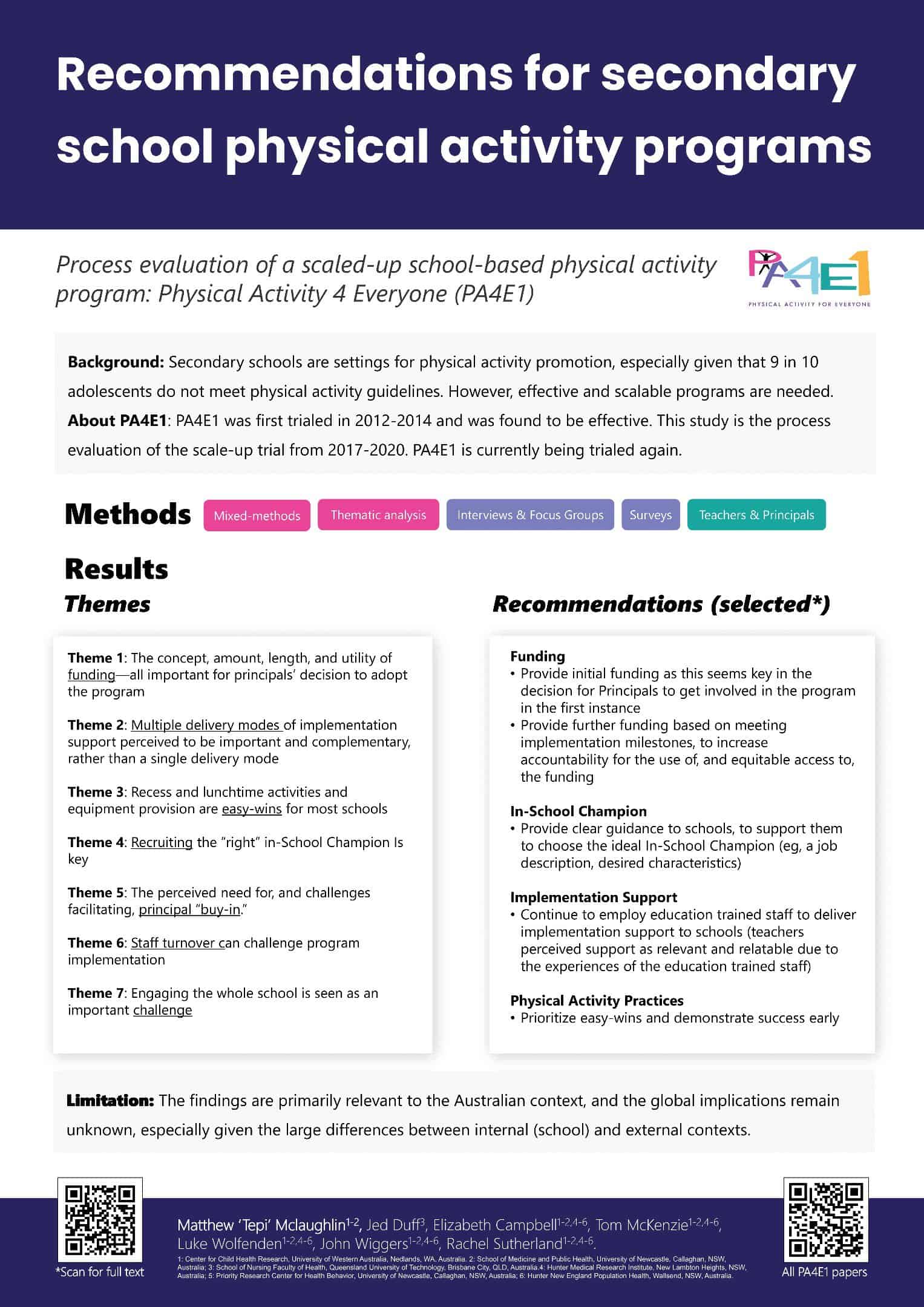
Process evaluation of a scaled-up school-based physical activity program: Physical Activity 4 Everyone (PA4E1)
Abstract Overview
Background: To explore why and how physical activity programs work, there is a need for high-quality process evaluations. Physical Activity 4 Everyone (PA4E1) is a whole-school physical activity program, with demonstrated efficacy from a randomised controlled trial (2012-2014). PA4E1 was adapted and tested in a scale-up trial (2017-2020).
Purpose: Firstly, to describe the acceptability, appropriateness and feasibility of PA4E1 in the scale-up trial, from the perspective of school staff involved in PA4E1’s management and delivery. Secondly, to generate themes that may explain school staff assessments of acceptability, appropriateness and feasibility.
Methods: Data were collected at various time-points throughout the two-year implementation phase. Online surveys, focus groups and interviews were collected from in-School Champions, Head PE teachers, Principals, and PE teachers involved in the delivery and management of the program in secondary schools (n=24). Published data on website engagement, adaptations, modifications and school PA4E1 practice implementation (primary trial outcome) were triangulated with surveys, interview and focus group data during analysis to generate codes, then refined into themes.
Results: School staff delivering PA4E1 reported it was highly acceptable, appropriate, and feasible. Seven themes were generated relating to: how the program was funded; delivery modes of implementation support; identification of easy-wins; recruitment of the right in-School Champion; facilitating principal buy-in; mitigating the impact of school staff turnover; and, engaging the whole school.
Conclusions: Acceptability, appropriateness, and feasibility of PA4E1 were high. Recommendations based on the generated themes will be made, for example, provide clear guidance to schools when choosing their ideal in-School Champion.
Practical implications: The findings may inform future adaptations to PA4E1 and potentially other school-based physical activity programs more generally, as well as future scalability assessments of the suitability of PA4E1 for dissemination.
Funding: NSW Ministry of Health, Translational Research Grant Scheme; Cancer Council NSW; Hunter Medical Research Institute.

Additional Authors
Name: Matthew Mclaughlin
Affiliation: University of Western Australia & University of Newcastle
Presenting Author: no
Name: Jed Duff
Affiliation: School of Nursing Faculty of Health, Queensland University of Technology, Brisbane City QLD 4000, Australia
Presenting Author: no
Name: Elizabeth Campbell
Affiliation: Hunter New England Population Health, University of Newcastle
Presenting Author: no
Name: Tom McKenzie
Affiliation: Hunter New England Population Health, University of Newcastle
Presenting Author: no
Name: Lynda Davies
Affiliation: Hunter New England Population Health, University of Newcastle
Presenting Author: no
Name: Luke Wolfenden
Affiliation: Hunter New England Population Health, University of Newcastle
Presenting Author: no
Name: John Wiggers
Affiliation: Hunter New England Population Health, University of Newcastle
Presenting Author: no
Name: Rachel Sutherland
Affiliation: Hunter New England Population Health, University of Newcastle
Presenting Author: no

